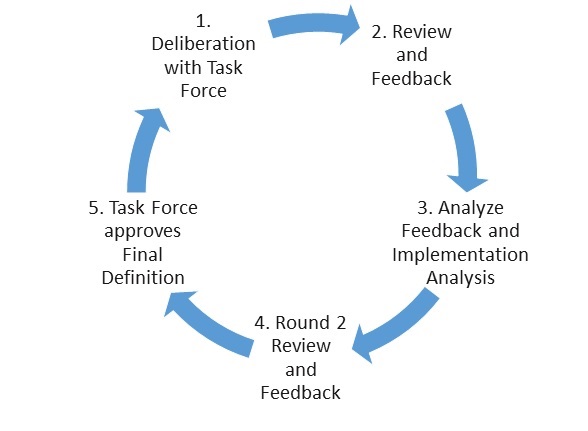Decision Cycles
Final Draft: Decision Cycles 7+8
The Power to the Profession Task Force is excited to share with you the final draft of Decision Cycle 7+8. This document, which includes the results of public comment and engagement with the field, outlines recommendations related to a supportive infrastructure and shared accountability for the early childhood education profession.
Join us! Read the draft, also available in Spanish and share with your colleagues.
Educadores hispanohablantes:
Tome un momento para explorar nuestra página en español sobre Power to the Profession (Revalorizar la profesión).
Power to the Profession Modules: Summary Statements, Study Guides and Additional Resources
The Urgent Need to Advance as a Unified Profession to Benefit Children and Families
The resources in this section are to help you reflect on some of the foundational questions of Power to the Profession, such as: What is this initiative about? Why are we approaching it in this way? What problems are we trying to solve?
Review
Unifying, Defining, and Owning the Profession, Jacqueline Jones, PhD, President/CEO, The Foundation for Child Development
You Can’t Have Professionals Without a Profession, Laura Bornfreund and Stacie Goffin
Redirecting Early Childhood Education’s Developmental Trajectory: Becoming A Recognized Profession by Stacie G. Goffin - Dec. 1, 2017
A Letter to Every Adult Who Was Once A Child and Turned Out Fine by Rhian Evans Allvin - May 10, 2017
Reflect
Summary Statements and Study Guide
Declaraciones resumidas y guía de estudio
Power to the Profession Implementation and Timeline
Review
Introduction to Power to the Profession - Webinar hosted by Rhian Evans Allvin, CEO, NAEYCEarly Childhood Educators: Advancing the Profession – Executive Summary from NAEYC
Early Childhood Education’s Future as a Profession: The Ball’s In Our Court; by Stacie G. Goffin
The Profession – Let’s Get on the Same Page; by Samantha Marshall - Aug. 26, 2017
Reflect
Summary Statements and Study GuideDeclaraciones resumidas y guía de estudio
Decision Cycle 1 - Professional Identity and Boundary
The initial cycle addressed the name, identity, scope, and responsibilities of what has been embraced as the early childhood education profession. With multiple rounds of responses and engagement, the content outlined in Decision Cycle 1 is based on the central concept that early childhood educators care for and promote the learning, development and well-being of children birth through age eight in all early childhood settings while meeting the qualifications of the profession and having mastery of its specialized knowledge, skills, and competencies.
Review
Is Early Childhood Education a Profession? by Teri Talan - March 8, 2017
Pre-to-3: What is an early-childhood education professional? And what does that question mean for K-12 administrators? by Linda Jacobson - Dec. 8, 2017
A Profession-Led Dialogue: A Letter from the Chief Executive Officer to NAEYC Members by Rhian Evans Allvin - Feb. 22, 2017
Power to the Profession Decision Cycle 1 Task Force documents
Consensus Draft for Decision Cycle 1 approved by the P2P Task Force
The Early Childhood Profession within the Early Childhood Field (graphic)
La Profesión de la educación de la primera infancia dentro del campo de la primera infancia
Reflect
Summary Statements and Study Guide
Declaraciones resumidas y guía de estudio
Decision Cycle 2 - General Competencies
The second cycle addressed the question of how to use our existing resources and arrive at a set of agreed-upon standards and competencies that encompass required knowledge and skills for all individuals within the early childhood education profession, as defined in Decision Cycle 1.
Update: Draft #2 of the leveling of Professional Standards and Competencies for Early Childhood Educators has been released. This draft focuses on the levels of competency for early childhood educators by designation (ECE I, ECE II, ECE III). The workgroup is taking public comment until November 15, 2019.
Review
Competency documents to be considered in the review of early childhood educator competencies:
- Council for Exceptional Children - Special Educator Professional Preparation Initial and Advanced Standards, the Early Childhood Special Education/Early Intervention Specialty Set (Early Intervention/Early Childhood Special Education)
- DEC Recommended Practices (Evidence based practices necessary for high quality inclusive programs for all children birth to age 8)
- Council for Professional Recognition - Child Development Associate (CDA) Competency Standards (for center-based: Infant/Toddler and Preschool; Family Child Care; and Home Visitor)
- National Board for Professional Teaching Standards - Early Childhood Generalist Standards (for teachers of students ages 3 to 8)
- ZERO TO THREE - Critical Competencies for Infant-Toddler Educators (for educators supporting children birth to age 3)
Power to the Profession Decision Cycle 2 Task Force document
Consensus Draft for Decision Cycle 2 approved by the P2P Task Force
Reflect
Summary Statements and Study Guide
Declaraciones resumidas y guía de estudio
Decision Cycles 3, 4, and 5 - Specializations, Competency Attainment Source, Qualifications and Pathways
Given the deeply interconnected nature of Decision Cycles 3, 4, and 5, they are being addressed as a whole, rather than on a sequential basis. We cannot detangle professional preparation, professional designations, scopes of practice, and specializations.
This draft was open for a period of public comment for 13 weeks in the spring of 2018. The comments and feedback from the field were taken into consideration and given careful deliberation and used to inform Decision Cycles 3, 4, 5 + 6 described below.
Task Force Statement on feedback from Decision Cycles 3, 4, and 5 draft 1.
"We are deeply grateful for the thoughtful responses we received on the first draft of Decision Cycles 3, 4, and 5 related to preparation, specialization and career pathways for the profession." Read the full statement.
Review
Working Draft 1 for Decision Cycles 3, 4, and 5
Los ciclos de decisión 3, 4 y 5
Decision Cycles 3, 4, and 5 one pager
Reflect
Summary Statements and Study Guide
Declaraciones resumidas y guía de estudio
Decision Cycle 345+6 - Preparation, Pathways, and Compensation
Based on feedback and input from the early childhood field, the recommendations in this cluster of decision cycles represent key components of the unifying framework for the early childhood education profession. The first three recommendations are the second draft of Decision Cycle 345, which focuses on differentiating pathways and preparation. The fourth recommendation comprises Decision Cycle 6, which focuses on compensation.
Review
Decision Cycles 345+6 (Agreed upon by the Task Force)
Ciclos de Decision 345+6 (Decision Cycles 345+6)
Decision Cycles 345+6 Executive Summary
Resumen Ejecutivo El Marco Unificado de la Profesión de la Educación de la Primera Infancia: Primera Edición (Executive Summary)
Decision Cycles 345+6 Overview slide presentation
Recorded webinar was presented on December 18, 2018, and previews the content of the Decision Cycle 345+6 Discussion Draft 2.
Reflect
Overview of Content Revisions and Comparison Chart
Resumen de las Revisiones del Contenido (Summary of Content Revisions)
Frequently Asked Questions (Note: this document is continuously evolving and we will continue to add more questions as they come up.)
Respond
Share thoughts directly by emailing [email protected]
Decision Cycles 7+8 - Resources, Infrastructure, and Accountability
The next set of recommendations from the Power to the Profession Task Force, known as Decision Cycle 7+8, addresses the resources, infrastructure, and accountability structures needed across states and systems to support a prepared, diverse, well-compensated early childhood education profession.
Review
Decision Cycles 7+8
Ciclos de Decision 7+8
Reflect
Frequently Asked Questions - revised and updated
Decision Cycles 7+8 introduction webinar - recoreded August 15, 2019
Respond
Share your thoughts directly by emailing [email protected]
Concept of Decision Cycles
All the components of the framework for a unified profession are interconnected and dependent on one another. In order to manage this complexity, we are structuring the initiative into a series of coordinated, iterative and strategic decision cycles. These cycles are designed to be predictable and intentionally sequenced to build on one another in order to lead to a unified framework.
The goal of using cycles to approach this conversation is to be able to focus on one aspect of the unified framework at a time without losing its connection to the whole. The outcome of each cycle will be a defining document for each element of the unified framework. However, each document has the possibility to be revisited at a later cycle as new insights and connections are revealed.
Anatomy of Decision Cycle
-
Deliberations with Task Force meeting
Pre-meeting Information gathering including review and synthesis of research
Each Task Force meeting will end with a working draft statement on the topic of each cycle -
Review and feedback from the field
Draft statement available for review the Task Force meets
Draft statement first sent to Stakeholders
Comment period on working draft -
Analyze feedback from the field and implementation analysis
Task Force deliberates on changes, makes recommendations for working draft 2 -
Review and feedback from the field
Draft statement available after first public comment period closes
Comment period on working draft 2 open
Collect and analyze reaction to working draft 2 -
Task Force approves final draft
